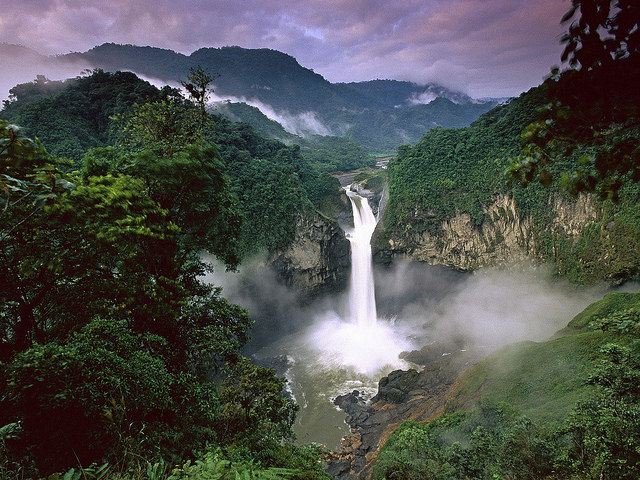- About
- Topics
- Story
- In-Depth
- Picks
- Opinion
- News
- Donate
- Signup for our newsletterOur Editors' Best Picks.Send
Read, Debate: Engage.

Josephine Koch, now a member of the 'Forum on Environment & Development' in Berlin, was present and witnessed the disappointment of a large part of the population of the South American country, who had so great expectations of the project. She joined a non-governmental action alliance called 'YASunidos', who launched a referendum to force a ban on the extraction of oil in the unspoiled part of the Yasuni National Park.
Our contributing editor Frank Odenthal interviewed Josephine Koch.
fairplanet: Ms Koch, in 2007, the Ecuadorian government proposed to abandon oil production in a certain part of the Yasuni National Park if the global community would compensate Ecuador for the lost profits. What did the Ecuadorian proposal look like?
Josephine Koch: First of all, the proposal came from the Ecuadorian civil society, which for over 25 years had tried to stop the exploitation of the land by the oil companies with all its damages to the people and to nature. When President Rafael Correa, then freshly elected, came to power at the head of an alliance of left-wing parties in 2007, he reacted to the pressure from environmental and human rights groups in the country, which wanted to protect the rainforest, which accounts for 19 percent of Ecuador, and its marginalized native people. More than 7 percent of all Ecuadorians are considered indigenous.
The proposal had four cornerstones. The area should cover about 23 percent of the entire Yasuni National Park, namely the areas called Ishpingo, Tambococha and Tiputini, from whose initials the name of the initiative "Yasuni-ITT" derives.
1. Preserving biodiversity. The Yasuni was classified by the UN as a World Natural Heritage and a biodiversity hotspot.
2. Protecting the territories of the indigenous population. Within the Yasuni-ITT area, two indigenous peoples are still living uncontacted. The Ecuadorian Constitution clearly prohibits any kind of resource exploitation in the territory of these peoples.
3. Global climate protection. About 410 million tonnes of carbon dioxide would be saved if the oil from the Yasuní-ITT is not burned; This corresponds approximately to the annual carbon emissions of France. The Yasuní-ITT Initiative would save 1.2 billion tons of carbon dioxide as a result of the avoided forest destruction and other damage caused by oil drilling.
And 4. The transition to a post-oil society. The gradual overcoming of dependence on oil and, if possible, other fossil raw materials.
"So the idea was to keep the oil in the ground forever and to diversify the economy of Ecuador."
Therefore, the world community, especially the oil-consuming industrialized countries which are the actual cause of climate change, should deposit at least half of the annual lost profits from oil production into a trust fund of the UN. It was estimated that revenues would be $ 7.2 billion a year at that time, so at least $ 3.6 billion had to be paid into the fund.
From this, Ecuador should be paid a certain annual amount over thirteen years to invest in the expansion of renewable energies, to promote ecotourism, to finance education and health programs and other environmental projects.
What is so special about Yasuni?
The national park covers almost 1 million hectares of tropical rainforest, with the surrounding biosphere reserve a total of 2 million ha.
"The Yasuní is one of the last intact rainforest areas in the world and is a true treasure trove of biodiversity."
The Amazon is considered to be particularly rich in species, but the Yasuni is kind of "megabiodivers": so far, there is no other place in the world with a greater density of plant, bird, mammal and amphibian species. More than 4,000 plant species are known in Yasuní. On one hectare there are 665 tree and bush species, which are more species than in the whole of Europe or the USA and Canada combined.
On the other hand, there are immense petroleum resouces hidden in the ground. About 20 percent of the country's petroleum reserves are located in the 200,000 hectares of the Yasuni-ITT area alone. That is 850 million barrels. For illustration: This is a quantity that is consumed globally in nine days.
On the other hand, there is the irreplaceable nature of the Yasuni national park, its value as a carbon dioxide storage facility and the threatened indigenous groups in the forest. The Yasuní is thus a symbol of a current human conflict: exploitation and profit in the name of "development" and "modernity" versus a balanced co-existance of man and nature - in the sense of the indigenous “Buen Vivir” concept, the idea of a good life for all.
In the Western societies, Ecuador's proposal was celebrated as a milestone in the fight against climate change. Did you share the euphoria?
It was indeed a revolutionary proposal. A relatively small country in the southern hemisphere, which is completely dependent on its oil exports (oil is the country's largest source of revenue and accounts for about 55 percent of total exports), makes such a proposal. That was (and still is) unique. Man and nature were put above profit, and thus also put other countries with larger deposits of fossil raw materials such as oil, coal or gas under pressure. It meant a step towards climate justice, as well as empowerment for those countries whose raw materials have been exploited in a colonial manner.
"The ITT-Yasuní initiative represents a reversal in the current economic behaviour, for a counter-project to the usual growth fetish."
It still inspires new forms of international cooperation to protect the climate, a necessity that sooner or later affects everyone.
There were, however, also critical voices, among others by former german development aid minister Dirk Niebel. What were the arguments of the opponents, and were the objections justified?
The role of Dirk Niebel is indeed to be emphasized. There was a decision beyond party boundaries by the German Bundestag to support the Yasuni ITT project.
"Niebel didn't care. He said he did not want to pay a country for idleness; Who would be next then, Niebel argued."
But that was the idea: to motivate other countries to followed Ecuador's path and to keep their fossile raw materials unterground for the sake of our climate.
Germany could have taken a pioneering role, and they were ready to do so. But then, at first, nothing was paid into the fund, and later, alternative projects such as REDD, which are not uncontroversial because of their market mechanisms, were promoted. But when Germany left the Yasuni-ITT project, it was a signal for other countries.
However, on the other hand, the strategy of the government of Ecuador was doubtful. President Correa, in particular, was not really credible. For example, the appointment of former representatives of the US oil company Chevron-Texaco as top management positions of the ITT initiative, or even by threatening again and again with a "Plan B".
And, of course, it can not really be guaranteed that any future government will adhere to the commitments to the initiative. That's why it was agreed that the money would have to be paid back in the case of oil production in Yasuní-ITT.
In 2013, the Ecuadorian President Correa declared the project failed and announced to award oil drilling licences at Yasuni ITT. What went wrong?
I think it would have been necessary to promote the project much more in public. The German federal government has missed a chance to take responsibility for its ecological guilt. In the end, by the middle of 2013, less than 1% percent of the agreed amounts were paid to the UN Fund, just 13.3 million USD, which is why the project failed.
However, the Ecuadorian government should have been more credible. As we know today, there were already secret negotiations with Chinese investors. President Correa's commitment to extractivism, ie the massive exploitation of raw materials, was, above all, opportunistic. The destruction of nature for the promotion of oil contradicts the "Buen Vivir", the good life, as it is anchored in Ecuador's society and constitution. Today, the government's planned expansion of oil production is absurdly carried out in the name of Buen Vivir.
What is the current status? Is the project dead? Or could it be revived?
On 22 May 2014, ironically, the International Day of Biodiversity, the Ecuadorian Ministry of the Environment awarded drills for Tambococha and Tiputini, two of the three ITT petroleum blocks. Since then the work on the necessary infrastructure is under way. It is unclear how much heavy oil, which is particularly expensive to extract, is already flowing. What financial gains the drilling could have is also more than questionable.
"There is no transparency, officially no one is given access to the drilling areas."
In the meantime, secret studies of the state oil company Petroamazonas have surfaced, claiming that the necessary infrastructure for the drilling can not possibly be implemented by 2018; and, in addition, that it is impossible to limit the impact of oil production to only one percent of the total area of the Yasuni – but that was a pre-condition under which the Ecuadorian Parliament agreed to the oil drilling in 2014.
The reconnaissance campaigns of the YASunidos civil society coalition have given rise to a new discussion of the oil problem, especially during the presidential elections this year. Correa's successor, Moreno, also from Alianza Pais, now has to deal with the growing skepticism about his government's oil plans.
Whether the project can be revived is hard to say. The momentum at the state level is gone. A new start should probably come from a grassroots movement. The YASunidos movement, for example, has many new ideas for the development of Ecuador to a post-fossil society; It would be a movement "from below", together with the frontline communities, the indigenous groups, and in cooperation with many NGOs from the northern hemisphere, through money, but also through know-how transfer in both directions. And movements such as "keep it underground" and other divestment initiatives calling for all relevant actors in politics, business and society to avoid extractivism and to depart from fossil fuels.
But we can not wait for social-ecological movements like the Yasuni, or the Niger Delta, the Lofoten, Bolivia, Colombia, but also the anti-fracking movements in Europe or the fight against tar sands oil production in Canada, to be put again on such a high institutional level.
Through resolute action by a committed, enlightened civil society, which is solidarized across regional and national borders, great political pressure can be built for divestment of fossil raw materials and concrete alternative projects to be implemented.
One example is the international campaign "Break Free from Fossil Fuels". Last year in May, thousands of people on 6 continents participated in courageous actions of civil disobedience. Also in Ecuador, where the YASunidos and other alliances occupied a site with a symbolic action, the terrain cleared for the construction of the so-called Pacific Petroleum refinery.
At the same time, YASunidos Germany participated in the end-ground campaigns against the end of coal production and combustion in the German mining areas. This year, at the same time, a human chain has successfully blocked an access road into the Yasuní. And German environmental alliance “Ende Gelände” is also planning a variety of creative actions this year to take climate protection into its own hands, and to turn governments and industry into alternative, viable solutions for all people.
